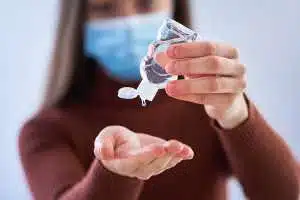
You may use water and soap or even sanitiser to wash your hands. Both ways of disinfecting can protect you from getting sick. However, the perfect way to clean your hands, especially when you don’t have soap or water, is by using a sterilizer. But using all these precautions alone will not prevent you from getting Sars or other viral diseases like the Herpes Simplex viral exams, so you don’t need to travel. But also have to take a PCR test in London Battersea to ensure you are free from the disease. This article explains how and when to use cleansers. Also, it clarifies when to wash (with soap and water) instead of using a shop disinfectant. Read on to learn how to defend yourself from viruses and bacteria outbreaks.
How does sanitiser work?
For most people, sanitiser is an excellent way to cleanse your hands because you won’t need soap and water. You may use most brands on the go. Often, such disinfectants include ethyl alcohol or isopropyl alcohol. Let’s assume that you don’t have water or soap to clean. In such a case, You may use sterilizers to destroy germs on your skin.
Furthermore, alcohol kills viruses like COVID-19, herpes, and bacteria on your skin. It cuts the defensive layer of proteins for microbes, dissolving their membranes and destroying their genetic material. When genetic material is destroyed, it is not detected in a qPCR or a test for STIs, giving a negative result for COVID-19 and herpes.
Comparison between using cleanser and washing
Cleaning the hands with soap and water is more effective than using a hand-gel product. The CDC claims it is a safer technique to wash because soap water kills viruses and pathogens. Therefore, the CDC argues that soap water kills germs better than disinfectants. Is your skin filthy or greasy? These products don’t work well on such hands. Thus, use water and soap to disinfect.
Furthermore, soap water absorbs the grease or dirt on the surface. Can cleansers protect you from viruses? Cleaning products like sanitizing solutions and conducting a PCR test in London Battersea can protect you from viral diseases like COVID-19 and herpes.
Even more, this is approved for use in clinics. Here, healthcare experts use it to clean surfaces, which prevents the transmission of various bacteria and Covid-19 viruses. If you use a sterilizer correctly and in the right situations, it protects you against infections. It can protect you from viral and bacterial diseases like STIs and other illnesses. You must add a disinfectant (with at least 60% alcohol) and thoroughly rub the surface. Please wait for it to dry before resuming what you’re doing.
Due to Herpes virus tolerance, shop-based products can raise the risk of such infections. It has also been found to be less effective at avoiding illness than washing. Yet, the data is vague so far. Nevertheless, sanitizing your hands is even safer with no soap and water.
Can sanitiser end the outbreak?
The best protection during the cold and flu season is a flu vaccine, daily hygiene, and a same-day PCR test Clinic. Get a check to see if you have any symptoms. Here, experts and doctors recommend using an alcohol-based cleanser. You may follow this with various practices to help the digestive system fight diseases. These practices are working out, getting enough sleep, hydrating, and eating healthy meals. Grooming should be your daily routine. After using the toilet, you can wash your hands.
Moreover, use a sterilizer after managing garbage and before or after feeding. In other cases, you may use it after touching an animal or food and treating a wound. Clean all devices using a disinfectant. Also, stay away from others. After all, such practices would help slow down the spread of the current Covid-19 outbreak.
